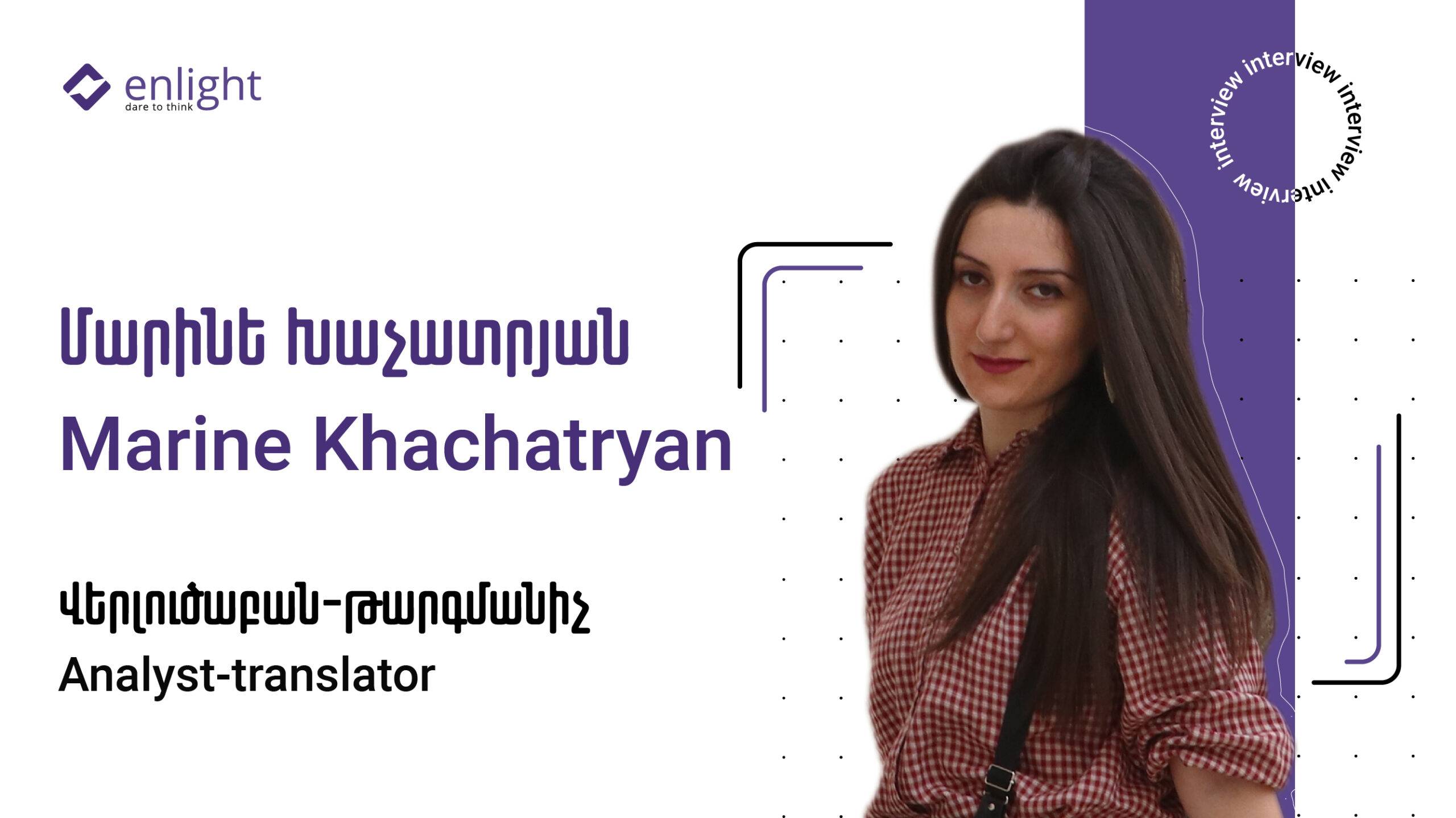Marine Khachatryan: art critic, coordinator of “Medialab” educational project, columnist of “Critical Journal” website, analyst and translator at “Enlight” Public Research Centre NGO
How did you become an “Enlight” member?
After graduating from the university I was looking for several opportunities to write articles and develop my writing skills. It was during that time when I met Anna Khachyan, who in detail told everything about the visions and activity of the organisation. Then I decided to apply for the position of an analyst and became a volunteering member.
Which language in your opinion will be of the utmost demand several decades onward and why?
I think that the tendency of English as the most demanded language will intensify, and it will continue its triumphant journey worldwide. This is even proven by the fact that English is the main language applied in continuously developing technologies, which become available in more and more countries.
As a result of the deepening tendency of globalization, the availability of the Internet, the so called elimination of borders, the unprecedented growth of travels and mobility, and the large volumes of trade, the need for knowledge of a single universal language making communication between not only individuals but also countries and companies available has gradually intensified. And the best candidate is English due to several reasons like availability, the United States as a superpower and so on. So, most likely English, or perhaps another language will act as a mediator between individuals and corporations which “misunderstood” each other previously.
Are you proud of any translator you know? If so, who is that person and why are you proud?
I cannot say I’m proud, I just admire a translator who translated fiction, solving quite complicated problems of translating intricate terminologies into Armenian. His name is Zaven Boyajyan. Though I do not know him personally, I am familiar with some of his translations. ‘‘The Martian Chronicles’’, a book by Ray Bradbury that I have recently read was one of the translations where the author was able to gently convey the unique style of the novel by both staying true to the writer’s say and making the alien content sound more local.
Which language would you like to study in the future? Why?
I would like to deepen my knowledge of Russian bringing it to a working level, as this language opens doors to some professional opportunities, for example, many valuable books or articles available in that language. In addition, when translating into Armenian, the comparison of English and Russian sources in problematic cases brings the quality of the translation to a higher level. Secondly, I am going to study French, as I would like to get acquainted with the French scientific critical thought, literature, music and cinema in the original.
Which language do you think is the world’s most beautiful one both orally and written?
In my opinion the most beautiful spoken language is French, I do not have a preferred language in writing. However, l do not want to sound pathetic, but the most harmonious and capacious language for me is Armenian, which gives people mastering it the widest opportunities of working with it.
The most beautiful sentence you have ever translated.
I deal with a lot of beautiful sentences but I would like to mention the two sentences that I have recently translated.
“We find a pursuit of illusions of artistic progress, of personal peculiarity, of “the new style,” of “unsuspected possibilities,” theoretical babble, pretentious fashionable artists, weight-lifters with cardboard dumb-bells…
The idea of Kunstwollen “art will” or “art impulse” was one of those omnivorous explanatory concepts that set susceptible academic hearts beating faster for two or three generations.“
Do you have a source of inspiration. If yes, what is it?
My sources of inspiration change from time to time. However, I would like to mention one of the seemingly inaccessible benchmarks that I had set before myself recently. It is the qualitative level of quality of Susan Sontag and Hal Foster.
How many hours a week do you spend on translating?
Depending on what kind of programs I am involved in, the time range spent on translating ranges between an hour to 22 hours a week.
What advice would you give to the new translators?
Probably my advice would be to specialise in the language they study not only by reading, but also by appearing in its environment for a while, to penetrate into the depths of linguistic nuances, to master the clutches of the language and, why not, the pitfalls. In addition, I reckon the translator should translate from the field s/he is competent or wants to become competitive. And finally, you need to translate as much as possible to “stay fit” and to improve.
Which particular idea of “Enlight” attracts you and why?
The overall idea of “Enlight” Public Research Centre NGO is based on serving the interests of the public, in particular, the materialisation and development of the existing research and analytical potential. For that purpose “Enlight” has adopted the slogan”Dare to Think!” I assume, the courage of thinking is the basis of any critical writing. It would not be an exaggeration to say that I made my first small steps of gaining that courage as an “Enlight” member, having this very slogan in my mind. Thinking is a courageous endeavour, because the first attempts are largely doomed to failure, but it is the totality of those ongoing failures that leads to more and more effective organisation of thoughts. Putting the courage of thinking at the heart of critical thinking, “Enlight” has created a truly fertile ground for the gratuitous work of materialising the existing intellectual potential.
Interview by Anna Manukyan.









